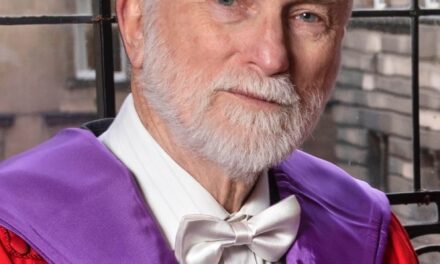Jesus Christ ends His illustration of the Parable of the persistent widow by affirming His Second Coming (Lk 18:1-8). He linked His Second Coming directly to faith, with continued, pursuing prayer. Need drives reliance on God. Like the persistent widow, continuing to bring a need to God does not show a lack of faith, but just the opposite. Jesus’ question, ‘Nevertheless, when the Son of Man comes, shall He find faith on the earth,?’ suggest that as the time of His return draws nearer, evil will be so increased that many in the church will stop depending on Jesus Christ and forsake their faith in Him (Matt 24:11-13, 24; 1Tim 4:1). Just as abundance fosters self-sufficiency, corporate and individual apostasy will increase. A life of ease will cause people to lose sight of their spiritual needs and the necessity of a relationship with God.
In an age when church and leadership are declining, so is faith. Christians and denominations are at a missional crossroads. Faith is declining just as denominations are now prioritising self-preservation and maintenance over evangelism and the mission of God. God’s mission of redeeming people through the power and Gospel of Jesus Christ, though urgent, is hindered by the same human institution that killed Jesus as guilty though innocent. When the truth of the Gospel is compromised, the soul of the church, the integrity of the leadership, and faith itself are lost.
True saving faith, the kind that brings us back into a personal and eternal relationship with God, involves more than simply believing and agreeing in our mind that Jesus Christ is the Saviour. Real faith in God requires action, just as genuine repentance requires a change of direction and behaviour. As Christians, we put our faith into action by breaking away from sin and deciding in our hearts to live in a way that pleases God. Faith that includes repentance is always a condition for spiritual salvation. (Mk 1:15; Lk 13:3, 5, Acts 2:38).
The decision to turn from sin, which is rebellion against God, to receive spiritual salvation involves accepting Jesus Christ as both Saviour who rescues us from the penalty of sin, and as Lord, the highest authority over our lives. Repentance is an opportunity for all sinners to choose to turn from sin and turn to God. Repentance is made possible by the grace, undeserved favour and love God has shown us through the sacrifice of His ONLY SON, Jesus Christ. Without repentance, religion turns us inward, and we begin to live like the rest of the world, apart from the Gospel. Religion is subtle and can often masquerade as loyalty, tradition, or even faithfulness. However, when it turns inward, it creates mistrust, widens division, and shifts focus from God’s kingdom to human kingdoms. Religion undermines mission and evangelism because it breeds pride instead of repentance.
From Genesis to Revelation, God’s story is one of faith. God called Abraham, and others walked with God by faith (Heb. 11). Jesus commissioned the church to go by faith and make disciples of all nations (Matt. 28:19). This global, boundary-breaking faith began with faithful people. The famous hymn, “Faith of our Fathers,” by Frederick W. Faber, points to the lives of the saints who died for their persistent faith.
The persistent widow in Jesus’ Parable exemplifies and resonates a response to Jesus’ question, ‘When the Son of Man comes, shall He find faith on the earth?’ The persistent widow’s model of faith is about consistent and diligent prayer without ceasing to fully accomplish God’s plans, mission, and purposes despite oppositions, persecutions and hatred against the Gospel. In this life, we will face injustice, tribalism, rejection, racism, and abuse. The main adversary is Satan, using human institutions like the unjust judge, shaped by abstract and horrific violence and subtle, unrepentant hearts ravaging our nations and churches today.
The persistent widow’s model of faith emphasises steadfast prayer, mission, and evangelism that demonstrate faith and trust in Jesus Christ. We are in the final days before Jesus Christ’s return, and there will be increased satanic and demonic opposition not only to the prayers of God’s faithful people but also to mission and evangelism. For Christ to find faith on earth when He comes, persistent widows, that is, the remnant faithful followers of Jesus Christ, must resist the urge, the suffering, to quit praying, mission, and evangelism. Satan’s schemes and the pleasures of the world are making many give up a persistent prayer, evangelism and mission (Matt 13:22; Mk 4:19).
On this eve of All Saints’ Day, God is calling us to persist in prayer and evangelism as we prepare for the Second Coming of Jesus Christ. All Saints’ Day is a reminder of the future hope and final judgment associated with Christ’s return.











Recent Comments